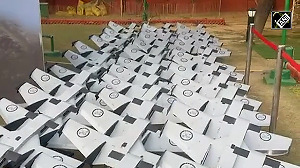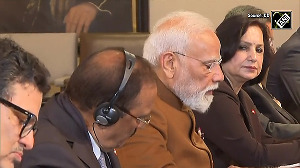In its hurried recognition of the new government in Male, has India lost sight of the ground realities in Maldives?
India believes that the resignation of Mohamed Nasheed, the former president of the Maldives and the leader of the Maldivian Democratic Party, has paved the way for a "legitimately formed government" under the new president, Mohamed Waheed Hassan, and that after the restoration of calm and stability in some months, fresh elections should be held in the Indian Ocean island.
Government sources have insisted that Nasheed -- who surprisingly ousted the dictator and former president, Maumoon Abdul Gayoom, in 2008, when free and fair elections were held after 25 long years -- resigned on February 7 of his own accord and that the new president should now be given a chance to form a government of national unity.
For Rediff Realtime News click here
On the face of it, Nasheed, or "Anni" as he is popularly known in the Maldives, is already a "former" president. New Delhi dispatched a senior diplomat from the Ministry of External Affairs, M Ganapathi, to the Maldivian capital, Male, two days ago to oversee a smooth transition to power. Ganapathi has since met all sides, Nasheed and Hassan included, and will also confabulate with delegations from the United States (which arrived in Male on Saturday morning), the Commonwealth and the United Kingdom.
Still, it's the fragile situation on the ground that continues to cause concern. Several Indian journalists have spoken to President Waheed, and all his interviews indicate that he is there to stay. Reports of violence against MDP workers, especially in the southernmost Addu atoll -- according to one report, they have been stripped and chained and beaten up badly -- continue to flow in, although Male itself is relatively quiet.
New Delhi, government sources say, will insist that Waheed abides by his promise to keep Nasheed and his family safe. It's not clear, however, whether India has insisted that Waheed should also prevent the Maldivian police and the national defence forces from cracking down on MDP supporters.
If India believes that Waheed should be allowed to take charge, one could come to the indelicate conclusion that it has dumped Nasheed -- for a variety of reasons.
The first is that Nasheed did not "seek assistance" from India, even though India's high commissioner to the Maldives D Mulay was in close touch with him in the hours preceding the resignation, as well as afterwards.
Second, it is clear that Nasheed's apparent volte face, saying that he was forced to resign "almost at gunpoint", has embarrassed India. Several observers are now asking why India acted in such "unseemly haste", by issuing not only a press release offering unstinted cooperation to the new dispensation, but also following that up by a phone call to Waheed from none other than Prime Minister Manmohan Singh.
"India could have simply issued a statement saying it was watching the situation, instead of reacting so quickly. As things clarified, India could have decided what side to take," goes the (off-the-record) chorus of those that are critical of the manner in which Delhi has adjudged the situation.
Third, India believes that a power vacuum in the Maldives is certainly not in its interest. There are the Islamists -- whom, incidentally, Nasheed fought with such vigour during his three-year tenure -- waiting on the sidelines to infiltrate the power structure.
And then there is the People's Republic of China. China's maritime power in the Indian Ocean has been increasing, and it sought to woo Nasheed and the MDP by offering to build everything from houses for the Maldivian people, to a history museum, to expanding its naval interests.
It is to Nasheed's credit that he turned down the Chinese bait each time, because he knew that New Delhi would be deeply unhappy if he had accepted. The truth is, of course, that India believes that South Asia is part of its zone of influence, and that other powers -- especially the Chinese -- have no business there.
For its part, China moved deeper into the Indian Ocean and established itself in the Seychelles, another island country, and one that is cheek by jowl with Mauritius -- one more country with very close ties to India. Coincidentally, the Prime Minister of Mauritius Navin Chandra Ramgoolam was dining with Dr Singh on the same day that Nasheed was being ousted in Male.
Nasheed is a former prisoner of conscience -- he has been described as such by Amnesty International -- who was in jail during Gayoom's regime for seven years, including two in solitary confinement. In that time he read Raj Thapar's book All These Years from cover to cover so often that he got to know it almost by heart. Unsurprisingly, he has consistently displayed an independent-minded streak that shows up in the most trying of circumstances.
He and his wife, Laila, made several trips to India -- when he was a nobody as well as when he was president -- discarding protocol and making friends with people across the spectrum.
Not least, he brought his tiny country -- with a population of 3,20,000 people across 1,200 islands -- into the news, whether it was because he always spoke up in favour of drastically curbing the human impulse that was causing havoc with the environment, or because he was disagreeing with nations like India on subjects like Myanmar.
As he walks about Male in his flip-flop slippers, no longer a president but still not a fully free man, you can be certain that he's not giving up the fight. Watch the crowds as they call out to him in support. They will grow, certainly, and Anni will marshal his charisma as well as his changed circumstance into a democratic movement.
The Maldives is certain to spring a surprise and Anni will be at the centre of it. The question is: how is India going to deal with that moment when it comes, sooner than later?











